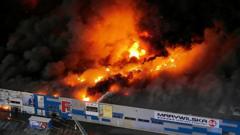Poland's government, led by Prime Minister Donald Tusk, asserts that the fire, which obliterated numerous small businesses, was an orchestrated act of sabotage linked to Moscow’s covert operations in Europe.
**Poland Claims Russian Intelligence Behind Arson Attack on Warsaw Shopping Centre**

**Poland Claims Russian Intelligence Behind Arson Attack on Warsaw Shopping Centre**
In a startling accusation, Poland blames Russian intelligence for the devastating fire that engulfed a major shopping centre in Warsaw last year.
Poland's Prime Minister Donald Tusk has leveled serious allegations against Russia, claiming their intelligence services orchestrated a significant fire that nearly destroyed the Marywilska shopping centre in Warsaw. In a recent statement on X, Tusk affirmed Poland's conviction that the fire, which broke out in May 2024, was a calculated act of arson ordered by Russian special services. He noted that several individuals believed to be responsible have already been apprehended, while others remain at large and are actively being pursued.
The inferno wreaked havoc on the local economy, decimating around 1,400 small businesses, many of which were run by members of Warsaw's Vietnamese community. Following a thorough year-long investigation, Polish authorities concluded that the fire was orchestrated by an unnamed individual residing in Russia. Justice and interior ministers issued a joint statement asserting that the arsonists were "organised and directed by a specific person" based in the Russian Federation and that they are collaborating with Lithuania, which is linked to the illicit activities.
The context of this accusation lies in the ongoing tensions resulting from Russia's extensive military aggression in Ukraine, which commenced in 2022. Since then, Poland has intensified its crackdown on individuals accused of supporting Russian intelligence, asserting that such incidents form part of a "hybrid war" waged by Moscow - a strategy of deniable attacks aimed at damaging adversaries’ infrastructure.
NATO has also voiced concerns about Russia's alleged hybrid warfare tactics, emphasizing that these operations are designed to intimidate or destabilize Western nations that continue to support Ukraine. In a related incident, Lithuania has similarly accused Russian military intelligence of being involved in an arson attack on an Ikea store in Vilnius.
The Marywilska shopping centre, which opened its doors in 2010, suffered irreparable losses during the fire. Many workers reported losing critical personal documents and substantial cash amounts that they kept at the shopping centre for safety. In response to the fire's devastating effects, the owners established a temporary shopping centre just three months later to help approximately 400 traders regain their footing. Besides this, an alternative shopping site opened in Warsaw, ensuring traders had a new location to resume their businesses by October 2024.
The inferno wreaked havoc on the local economy, decimating around 1,400 small businesses, many of which were run by members of Warsaw's Vietnamese community. Following a thorough year-long investigation, Polish authorities concluded that the fire was orchestrated by an unnamed individual residing in Russia. Justice and interior ministers issued a joint statement asserting that the arsonists were "organised and directed by a specific person" based in the Russian Federation and that they are collaborating with Lithuania, which is linked to the illicit activities.
The context of this accusation lies in the ongoing tensions resulting from Russia's extensive military aggression in Ukraine, which commenced in 2022. Since then, Poland has intensified its crackdown on individuals accused of supporting Russian intelligence, asserting that such incidents form part of a "hybrid war" waged by Moscow - a strategy of deniable attacks aimed at damaging adversaries’ infrastructure.
NATO has also voiced concerns about Russia's alleged hybrid warfare tactics, emphasizing that these operations are designed to intimidate or destabilize Western nations that continue to support Ukraine. In a related incident, Lithuania has similarly accused Russian military intelligence of being involved in an arson attack on an Ikea store in Vilnius.
The Marywilska shopping centre, which opened its doors in 2010, suffered irreparable losses during the fire. Many workers reported losing critical personal documents and substantial cash amounts that they kept at the shopping centre for safety. In response to the fire's devastating effects, the owners established a temporary shopping centre just three months later to help approximately 400 traders regain their footing. Besides this, an alternative shopping site opened in Warsaw, ensuring traders had a new location to resume their businesses by October 2024.




















